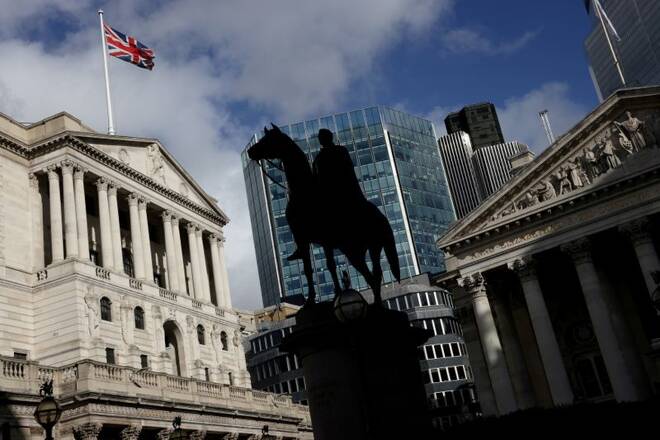Advertisement
Advertisement
Bank of England should be vigilant on labour costs – Haskel
By:
LONDON (Reuters) - Financial markets' expectations of a rise in Bank of England interest rates over the coming year reflect a stronger economic outlook than during the depths of the COVID-19 pandemic, BoE policymaker Jonathan Haskel said on Tuesday.
By David Milliken
LONDON (Reuters) -The Bank of England needs to be vigilant about rising labour costs as a tight job market means wages might rise faster than productivity and put upward pressure on inflation, BoE policymaker Jonathan Haskel said on Tuesday.
BoE Governor Andrew Bailey says interest rates are likely to go up and investors see a 90% chance of a hike in December.
Financial markets were wrong-footed earlier this month when seven of the BoE’s nine rate-setters – including Haskel – opted to wait for more job market data before raising borrowing costs.
In a speech to students at the University of Glasgow’s Adam Smith Business School, Haskel said much of the recent rise in inflation was due to global factors such as imported goods and energy prices that were likely to drop out of the figures.
He said he was in “team transitory” on the question of inflation’s persistence. However, there was a risk that wage growth could exceed productivity growth, which has been weak in Britain for more than a decade.
“The latest data continues to indicate a tight labour market, putting upward pressure on wages. From a living standards point of view, this is of course excellent news, but from an inflation point of view this has to be matched by increased productivity and so we have to be vigilant,” he said.
Record vacancies
“Buoyant” jobs data recently suggested that a scenario where demand for labour petered out and recovery stalled looked unlikely now, he said, but it was too soon to tell how well job-seekers’ skills matched the record-high number of vacancies.
Haskel gave few clues about the short-term outlook for rates and said their longer-term path – rather than which month borrowing costs begin to rise – was more relevant for most businesses and members of the public.
“Lots of people are very fixated on month-by-month or meeting-by-meeting potential changes in rates. But … that’s not really what the majority of people … are interested in.”
The outright size of the economy – which has not yet recovered to its pre-pandemic level – was also important for monetary policy, alongside the health of the labour market.
Market expectations for increases in BoE rates over the coming year reflected a stronger economic outlook than during the depths of the COVID-19 pandemic, Haskel said.
“The prospective rise in Bank Rate from its emergency level – whenever that comes – is not a bug, but a feature. It reflects the success of fiscal, health and science policy in dealing with worst economic shock in 100 years,” he said.
(Reporting by David Milliken; Editing by William Schomberg and Alex Richardson)
About the Author
Reuterscontributor
Reuters, the news and media division of Thomson Reuters, is the world’s largest international multimedia news provider reaching more than one billion people every day. Reuters provides trusted business, financial, national, and international news to professionals via Thomson Reuters desktops, the world's media organizations, and directly to consumers at Reuters.com and via Reuters TV. Learn more about Thomson Reuters products:
Did you find this article useful?
Latest news and analysis
Advertisement
